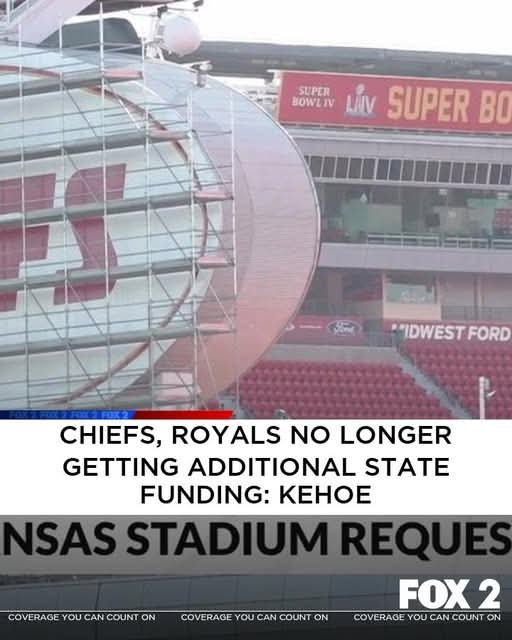In a move that could shake the very foundation of Kansas City sports, Missouri Lieutenant Governor Mike Kehoe’s office has reportedly indicated that the Kansas City Chiefs and Kansas City Royals should not expect additional state funding to support their ambitious stadium proposals. This revelation, which surfaced from sources close to the administration, has immediately sparked outrage, confusion, and a flurry of questions about what the future holds for both franchises.
The Chiefs and Royals have each made major headlines over the past year with their long-term visions to upgrade or relocate from their current homes at the Truman Sports Complex. The Chiefs, fresh off a dynasty-building run with Patrick Mahomes and company, have made it clear they want a state-of-the-art stadium to keep up with the likes of SoFi Stadium in Los Angeles or Allegiant Stadium in Las Vegas. Meanwhile, the Royals are actively pursuing a massive downtown ballpark and entertainment district that would reshape the city’s skyline and bring in billions in estimated revenue.
But Mike Kehoe’s team appears to be signaling a firm halt on that momentum.
According to reports, Kehoe’s office is placing a renewed focus on fiscal responsibility and statewide equity. “We are reviewing all taxpayer investments and prioritizing core infrastructure, education, and healthcare initiatives,” an official within Kehoe’s circle stated. “While sports are important to Missouri’s culture and economy, the state must draw a line when it comes to multi-billion-dollar funding requests from private franchises.”
That statement has not gone over well with many in Kansas City. Local business leaders, fans, and civic groups argue that both stadium projects are more than just sporting venues—they’re long-term investments in job creation, tourism, and economic growth. Chiefs President Mark Donovan has long stated that the team wants to remain in Kansas City but must have the infrastructure and support to remain competitive on the national stage.
Equally stunned are members of the Royals’ front office, who were banking on a public-private partnership to launch their new downtown stadium. With Kehoe emerging as a frontrunner for Missouri’s next governor, his stance could set the tone for state policy on major public projects for the foreseeable future.
Now, the pressure shifts to Kansas City leaders and team owners to identify alternative funding models—possibly relying more heavily on local tax measures, private investment, or out-of-state bidders looking to steal away one or both franchises. And with growing speculation that other cities like San Antonio or even St. Louis could present enticing offers, the stakes have never been higher.
This is more than just a budget decision. It could shape the identity and future of Kansas City sports for generations to come. Fans now wait with bated breath to see how the Chiefs and Royals respond—and whether Kehoe’s message is the beginning of a new era, or a costly gamble that backfires politically and economically.
